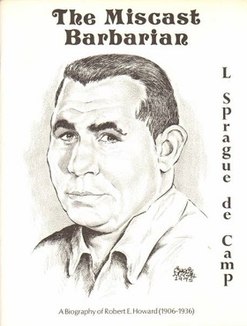
The Miscast Barbarian: a Biography of Robert E. Howard is a biography by science-fiction writer L. Sprague de Camp, first published in hardcover and trade paperback in 1975 by Gerry de la Ree.

A Gun for Dinosaur and Other Imaginative Tales is a short story collection by science fiction and fantasy author L. Sprague de Camp, first published in hardback by Doubleday in 1963, and in paperback by Curtis Books in 1969. The first British edition was issued by Remploy in 1974. It has also been translated into German.

Sprague de Camp's New Anthology of Science Fiction is a collection of science fiction stories by American writer L. Sprague de Camp, edited by H. J. Campbell. It was first published in both hardcover and paperback in 1953 by Panther Books.

The Virgin & the Wheels is a collection of two short science fiction novels by L. Sprague de Camp, published in paperback by Popular Library in 1976. An E-book edition was published by Gollancz's SF Gateway imprint on September 29, 2011 as part of a general release of de Camp's works in electronic form.
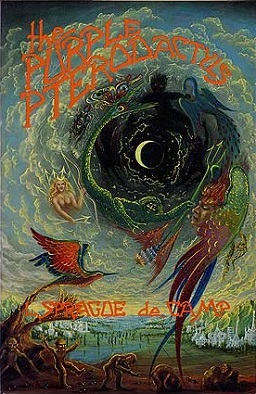
The Purple Pterodactyls is a collection of fantasy short stories by American writer L. Sprague de Camp. The collection was first published in hardcover by Phantasia Press in January, 1980, and in paperback by Ace Books in April of the same year. It has also been translated into German. An e-book edition was published by Gollancz's SF Gateway imprint on September 29, 2011 as part of a general release of de Camp's works in electronic form. The pieces were originally published between 1975 and 1979 in the magazines The Magazine of Fantasy & Science Fiction, Fantastic, Escape!, and Fantasy Crossroads.

Divide and Rule is a 1948 collection of two science fiction novellas by American writer L. Sprague de Camp, first published in hardcover by Fantasy Press, and later reissued in paperback by Lancer Books in 1964. The collected pieces were previously published in 1939 and 1941 in the magazines Unknown and Astounding. The first stand-alone edition of the title story was published as a large-print hardcover by Thorndike Press in September 2003. An E-book edition of the title story was issued by Gollancz's SF Gateway imprint on September 29, 2011 as part of a general release of de Camp's works in electronic form.

Antarctic Conquest: the Story of the Ronne Expedition 1946-1948 is a 1949 science book by Norwegian-American Antarctic explorer Finn Ronne and science fiction writer L. Sprague de Camp, published in hardcover by G. P. Putnam's Sons. The role of de Camp, who was commissioned as a ghost writer to recast Ronne's manuscript into publishable form, is uncredited. Ronne's working title was reportedly "Conquering the Antarctic".

The Pusadian series is a sequence of fantasy stories by L. Sprague de Camp, begun in the early 1950s and written under the influence of Robert E. Howard's Conan stories. It's also known as the Poseidonis series. It was the first post-Howard attempt at serious world-building of a fantasy setting in the Howard vein, prefiguring the numerous sword & sorcery settings of the 1960s and 1970s.

The Continent Makers is a science fiction novella by American writers L. Sprague de Camp, part of his Viagens Interplanetarias series. It was first published in the magazine Thrilling Wonder Stories in the issue for April, 1951. It first appeared in book form in the collection The Continent Makers and Other Tales of the Viagens, published in hardcover by Twayne Publishers in 1953, and in paperback by Signet Books in 1971. It has also been translated into Portuguese, Dutch, and Italian.

"The Wheels of If" is an alternate history science fiction story by American writer L. Sprague de Camp. It was first published in the magazine Unknown Fantasy Fiction for October, 1940, and first appeared in book form in de Camp's collection The Wheels of If and Other Science Fiction. It later appeared in the paperback edition of the collection published by Berkley Books in 1970, in de Camp's subsequent collections The Virgin & the Wheels and Years in the Making: the Time-Travel Stories of L. Sprague de Camp, and in the anthology Unknown Worlds: Tales from Beyond. It also appeared, together with a sequel by Harry Turtledove, in The Pugnacious Peacemaker/The Wheels of If and Down in the Bottomlands and Other Places. The story has also been translated into German.
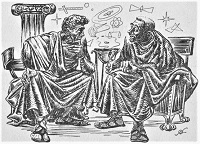
"Aristotle and the Gun" is a time travel and alternate history science fiction story by American writer L. Sprague de Camp.

"The Galton Whistle" is a science fiction short story by American writer L. Sprague de Camp, a story in his Viagens Interplanetarias series. It is the first (chronologically) set on the planet Vishnu. It was first published, as "Ultrasonic God," in the magazine Future Combined with Science Fiction Stories in the issue for July, 1951. It first appeared in book form under the present title in the collection The Continent Makers and Other Tales of the Viagens, published in hardcover by Twayne Publishers in 1953, and in paperback by Signet Books in 1971. It also appeared in the anthologies Novelets of Science Fiction, The Good Old Stuff, and The Good Stuff. The story has been translated into Portuguese, Dutch, and Italian.

"Summer Wear" is a science fiction short story by American writer L. Sprague de Camp, part of his Viagens Interplanetarias series. It is the first (chronologically) set on the planet Osiris. It was first published in the magazine Startling Stories in the issue for May, 1950. It first appeared in book form in the anthology The Best Science Fiction Stories: 1951, edited by Everett F. Bleiler and T. E. Dikty, published in hardcover by Frederick Fell in 1951, and was gathered together with other Viagens stories in the collection The Continent Makers and Other Tales of the Viagens, published in hardcover by Twayne Publishers in 1953, and in paperback by Signet Books in 1971. The story has been translated into Portuguese, Dutch, Italian and German.

The Green Magician is a fantasy novella by American writers L. Sprague de Camp and Fletcher Pratt. The fifth story in their Harold Shea series, it was first published in the November 1954 issue of the fantasy pulp magazine Beyond Fiction. It first appeared in book form, together with "The Wall of Serpents", in the collection Wall of Serpents, issued in hardcover by Avalon Books in 1960; the book has been reissued by a number of other publishers since. It has also been reprinted in various magazines, anthologies and collections, including The Dragon, The Complete Compleat Enchanter (1989), Masterpieces of Fantasy and Enchantment (1988), and The Mathematics of Magic: The Enchanter Stories of L. Sprague de Camp and Fletcher Pratt (2007). It has been translated into Italian and German.

"The Hardwood Pile" is a contemporary fantasy story by American writer L. Sprague de Camp. It was first published in the magazine Unknown for September, 1940. It first appeared in book form in the collection The Reluctant Shaman and Other Fantastic Tales ; it later appeared in the collection The Best of L. Sprague de Camp, and the anthology Bestiary! The story has been translated into French and German.
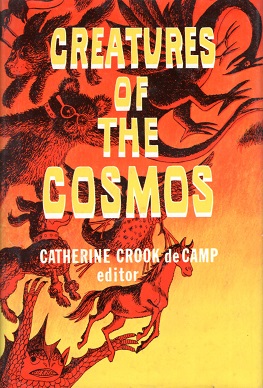
Creatures of the Cosmos is an anthology of fantasy and science fiction short stories for younger readers, edited by Catherine Crook de Camp. It was first published in hardcover by Westminster Press in 1977. It was the third such anthology assembled by de Camp, following the earlier 3000 Years of Fantasy and Science Fiction (1972) and Tales Beyond Time (1973), both of which she edited together with her husband L. Sprague de Camp.
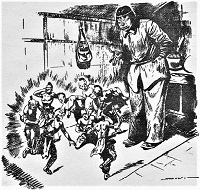
"The Reluctant Shaman" is a contemporary fantasy story by American writer L. Sprague de Camp. It was first published in the magazine Thrilling Wonder Stories for April 1947. It first appeared in book form in the collection The Reluctant Shaman and Other Fantastic Tales ; it later appeared in the magazine Science Fiction Yearbook no. 5 and the collection The Best of L. Sprague de Camp. The story has been translated into French and German.

"The Hibited Man" is a classic science fiction short story by L. Sprague de Camp. It was first published in the magazine Thrilling Wonder Stories for October, 1949. It first appeared in book form in the hardcover anthology My Best Science Fiction Story. It has also appeared in the paperback anthology The Shape of Things.

"In-Group" is a science fiction short story by L. Sprague de Camp. It was first published in the magazine Marvel Science Fiction for May, 1952. and later reprinted in the magazine Skyworlds for February 1978. It first appeared in book form in the collection A Gun for Dinosaur and Other Imaginative Tales. The story has been translated into Italian and German.
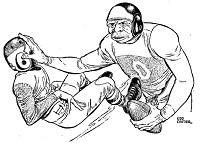
"Throwback" is a classic science fiction short story featuring atavism by L. Sprague de Camp. It was first published in the magazine Astounding Science Fiction for March, 1949. It first appeared in book form in the collection A Gun for Dinosaur and Other Imaginative Tales ; it later appeared in the anthology Apeman, Spaceman. The story has been translated into Italian and German.




















